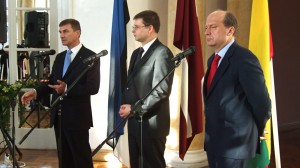
The three Baltic prime ministers (from left: Estonia's Andrus Ansip, Latvia's Valdis Dombrovskis and Lithuania's Andrius Kubilius) stressed a unified approach to the problems facing their countries. Photo by Harry Callan.
MEZOTNE, Latvia — The three Baltic prime ministers met in the elegant surroundings of Mezotne Palace near Bauska in southern Latvia Friday for talks which saw them cover a range of topics including tax integration, energy security and defense.
In a testament to the close relations between the three countries, the prime ministers also spent a fair chunk of time singing each others’ praises.
Estonia’s Andrus Ansip and Lithuania’s Andrius Kubilius paying tribute to the Latvian Prime Minister Valdis Dombrovskis just one day after he won a crucial parliamentary vote on his country’s €7.5 billion bailout deal from international lenders.
Kubilius said Dombrovskis had proven himself to be “a good friend and a real leader for Latvia.”
“His challenges were perhaps even more difficult than ours and what he had been able to achieve is very great,” Kubilius added, with Ansip echoing the sentiment.
Ignalina replacement still a go
On the subject of the proposed new nuclear power plant at Ignalina in Lithuania involving all three Baltic states plus Poland, Kubilus said the tendering process was moving forward “very effectively and rapidly” with a list of interested bidders ready by the end of February and a decision “before the middle of this year.”
The three leaders said they had also been looking at the future of the Baltics over the next decade and said they were mulling the idea of a joint Nordic-Baltic 2020 development strategy, though they gave few details of its likely content.
“We have to cooperate more and pay more attention to the Baltic Sea Strategy,” Ansip said.
On the sensitive subject of whether the Baltic presidents should attend World War II victory celebrations in Moscow on May 9, the prime ministers deferred to their respective presidents’ decisions, though Kubilius was quick to point out that Russian President Dmitry Medvedev had been invited to attend Lithuania’s March 11 celebrations of 20 years since it declared its renewed independence from the Soviet Union.
“Maybe he will come, maybe not,” Kubilius said.
Lithuania was the first Soviet republic to declare its renewed independence, with Latvia and Estonia following suit soon afterward.
Ansip reiterates euro readiness
Ansip restated Friday that his country had “already fulfilled all the criteria” to adopt the euro as its national currency.
Ansip made a point of stressing that Estonia was ready to adopt the euro in 2011, claiming that all the necessary criteria had already been fulfilled. He also said Estonian euro adoption would benefit the region as a whole rather than suck investment out of Latvia and Lithuania as some observers have claimed.
Speaking after a meeting with his Latvian and Lithuanian counterparts, Valdis Dombrovskis and Andrius Kubilius, at Mezotne Palace in southern Latvia, Ansip said Estonia’s euro accession would “help the whole region.”
The road to the euro, he said, justified hard-hitting budget cuts implemented in the Baltic states, all of which want to swap their local currencies for the pan-European currency.
“People understood why those cuts were necessary,” Ansip said












